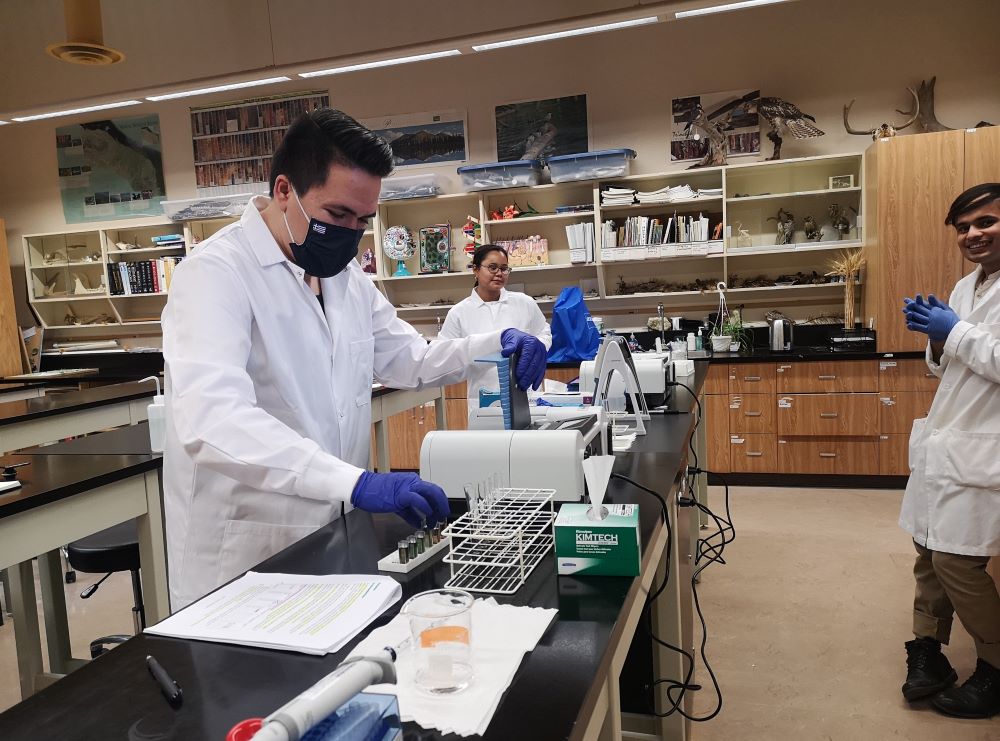This flexible science certificate offers university-transfer options into engineering, mathematics, earth, life and physical sciences.
The Certificate of Science is a 10-course (30-credit) certificate for students that wish to continue on in their science education either at Yukon University or another institution. Upon completion of the certificate, students can transfer into the second year of a Bachelor of Science program at many Universities in Canada. Students can choose to specialize in Biology, Chemistry, Geography, Geology, Computer Sciences, Physics, and/or Math. Courses are designed for transfer to most Canadian Universities, but with many local, Indigenous, and Northern examples. Students meet the requirements for Yukon First Nation Core Competency with the Yukon First Nations 101 course or a three-credit course from the list below.
Students also have the opportunity to take second-year courses that are commonly required for continuing studies in biology and life science-related fields. These studies can allow students to specialize in
- Anatomy and Physiology
- Cell biology and/or Genetics
- Microbiology
- Organic Chemistry and Biochemistry
- Ecology
Duration
Students graduate from this certificate with 30 credits (10 academic courses) in University-Transfer Sciences. Students need to determine a study plan in consultation with program advisors and select courses according to their long-term goals for transfer into other programs.
Students may choose from several pathways depending on their educational goals:
The following examples illustrate some common pathways, although others are possible.
Life & Environmental sciences
- MATH 100 & 101
- BIOL 101 & 102
- CHEM 110 & 111
- ENGL 100, ENGL 101 or COMM 204
- PHYS 101 or other elective and PHYS 102 or other elective.
Physical & Engineering sciences
- MATH 100 & 101
- CHEM 110 & 111
- PHYS 101 & 102
- ENGL 100 & ENGL 101 or COMM 204
- Plus 3 more courses (9 credits) – at least 2 from School of Science, chosen from the list of 100 or 200-level science courses. CPSC 128 or 129 recommended.
Geography or Earth sciences
- GEOG 101 & 102
- CHEM 110 & 111
- PHYS 101 & 102
- MATH 100 & 101
- CPSC 128 or elective
- ENGL 100 & ENGL 101 or COMM 204
Students must successfully complete 30 credits (10 academic courses), with a minimum of 5 courses in science, 1 course in English, and 2 courses in Math, and in addition to passing all the required courses, students must:
- complete 50% of the course work at Yukon University
- maintain a 2.00 cumulative GPA (C average) across the required courses
- meet the First Nations core competency
Yukon University recognizes that a greater understanding and awareness of Yukon First Nations history, culture and journey towards self-determination will help to build positive relationships among all Yukon citizens. As a result, you will be required to achieve core competency in knowledge of Yukon First Nations.
For details, visit Yukon First Nations Core Competency
The Certificate of Science is designed for students who wish to transfer credits into a science-related program at a Canadian university. Students can either complete the Certificate of Science, or match their course selections to meet the requirements of the program of their choice.
Many of the courses in the Science program are listed in the BCCAT Transfer Guide.
This certificate will allow students to pursue further education or a career in fields such as the following:
- Agricultural sciences
- Anatomy and Physiology
- Botany, medical and traditional uses of plants
- Climate change sciences
- Climate change mitigation and adaptation
- Computer Sciences
- Ecology
- Engineering
- Environmental sciences
- Environmental and Animal Ethics
- Genetics and Evolution
- Interpretation of Natural History
- Kinesiology
- Nutrition
- Molecular Biology, Cell Biology
- Medicine or health research
- Taxonomy, curation, Natural History
- Toxicology
- Teaching, Educational Research
- Traditional Knowledge systems and braiding with Scientific Knowledge systems
- Veterinary Medicine
- Wildlife Biology
Fees
Tuition for credit programs is calculated per course credit. See money matters for more information.
Some programs and courses have additional fees - see Ancillary Fees.
Student financial awards
Education is an investment in your future, your family and your community. Yukon University is pleased to support that investment by offering some of the most competitive tuition rates in the country, as well as several student financial awards to help offset your educational and living costs.
Financial assistance
There are government programs, scholarships, bursaries, awards and First Nation funding available to financially support you throughout your academic career.
See money matters for more information, or talk to our financial advising staff in the Student Services Centre. Email or call 867 456 8574 to make an appointment.
Students currently enrolled in a Yukon High School can take an undergraduate-level Yukon University course that is part of the British Columbia Council on Admission and Transfer (BCCAT) system if they meet the prerequisites. Many courses in the School of Science are suitable, such as CPSC 128, BIOL 101 & lab, BIOL 102 & lab, PHYS 101&Lab, MATH 100, CHEM 110 & lab, GEOG 101 & lab, and ENGL 100 or ENGL 101. There are other options (even a second-year course can be taken, if prerequisites are met)!
For more information about dual credit for Yukon high-school students, see the Dual Credit program page.
